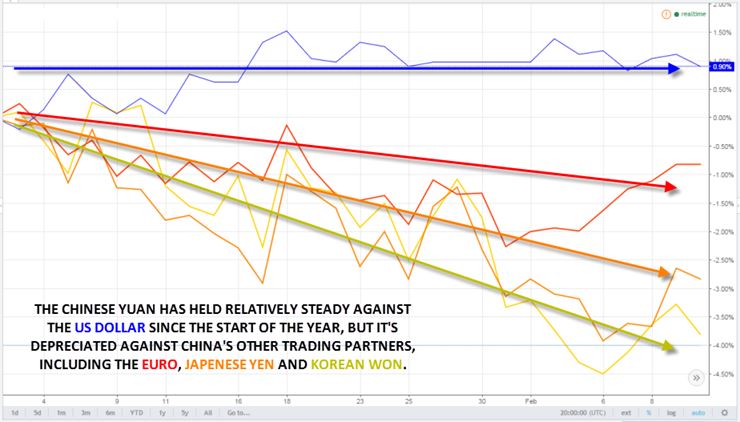For some reason, currencies are a particularly difficult concept for Americans to wrap their heads around. Just ask the new US president, who reportedly called his national security advisor at 3am one day in February to ask if a strong US dollar was good or bad for the US economy. Not surprisingly, the national security expert allegedly demurred, suggesting that the president ask an economist instead.
Frankly, even an economist would have difficulty answering that question unambiguously. In addition to reflecting a generally healthy economy, a stronger currency can increase the buying power of the citizenry, often at the expense of domestic industry. On the other hand, a weaker currency can make a country's exports more competitive, though it can increase inflation.
Back in the depths of the Great Financial Crisis though, when global inflation was essentially flat and unemployment rates were abnormally high, the answer to the president's question would have been clear: most countries preferred to have a weaker currency, reasoning that it would boost international demand for its goods. This preference led to the trumped up (no pun intended) "Currency Wars" of 2010-2013, where countries flirted with beggar-thy-neighbor competitive devaluations and protectionist policies to boost their domestic economy, often at the expense of global prosperity.
Cold War
Based on early comments from the administration, there's a risk of a similar economic conflict breaking out once again. In just a two week period, Trump has said that the dollar is “too strong” against the Chinese yuan and “it’s killing us", while White House trade advisor Peter Navarro accused Germany of using a “grossly undervalued” euro to “exploit” its trading partners. As a result of these comments and the actions of other G10 central banks, the analysts at PIMCO have dubbed the current FX landscape as a "Currency Cold War."
Unlike a traditional war with clear battles, a cold war is fought covertly and indirectly. When it comes to currencies, any attempts to weaken the domestic currency must, at least publicly, have different motives and plausible deniability, so that government cannot be accused of escalating the conflict. Much like THE Cold War of the late 20th century, the primary conflict in the budding Currency Cold War centers around two superpowers: in this case, the US and China.
For its part, the new Trump Administration is coming out swinging. On the campaign trail, Trump previously vowed to label China a currency manipulator on "day one", but he's since backed off slightly, though the issue still makes his list of priorities for the first 100 days. Though the US has refrained from taking that official step, Trump and his surrogates continue to make vague threats about leveling the global FX playing field.
China, while relatively new on the global economic stage, has plenty of experience in political cold wars, as its enforcement of the so-called "One-China" policy and the ongoing dispute over various islands in the China Sea exemplify. Indeed, as the chart below shows, China has successfully toed a difficult line thus far this year, allowing its currency to depreciate against most of its major rivals while holding steady against the US dollar.

Source: TradingView.com
What few casual observers realize is that China has been intervening in the currency market to "manipulate" the yuan's value, but instead of devaluing it, the country has actually been up the value of its currency. If the US opts to label China a 'currency manipulator' in the coming months, the People's Bank of China would have less incentive to spend this money to support its currency and the yuan's depreciation could accelerate.
Truly Nuclear
To return to the original cold-war analogy, the decision to label China a currency manipulator is hardly the "nuclear option." Even if the US Treasury officially dubs China a currency manipulator, the two countries must spend a year trying to resolve the conflict via negotiations before the US can enact token trade sanctions.
The true nuclear option would be direct protectionism, where the US slaps onerous tariffs and taxes on Chinese imports. While China would undoubtedly respond in kind, the US consistently runs a large trade deficit with China, meaning that it has far less to lose in the event of an escalating trade war. Viewed in this light, the US arguably holds the balance of economic power and could therefore extract some concessions from Xi Jinping and company in the coming months.
That said, a fundamental feature of cold wars is that they're inherently unstable. Even the smallest miscalculation or misinterpretation can rapidly devolve into the mutually assured destruction. Only time will tell if the two superpowers can successfully de-escalate the conflict or whether it will deteriorate into a catastrophic trade war.
